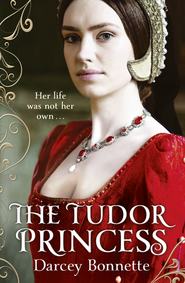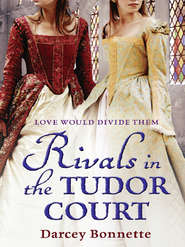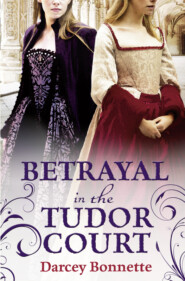По всем вопросам обращайтесь на: info@litportal.ru
(©) 2003-2025.
✖
The King’s Mistress
Настройки чтения
Размер шрифта
Высота строк
Поля
“Of course she doesn’t,” he says. His voice sounds so far away I am straining to hear him. “If you waited to extract a confidence from her you’d die of old age, with your curiosity quite unsatisfied. It’s all about listening. Mary Carey is not to be trusted; when she is not resentful of Anne she is influenced by her. She does not set her sights very far.” He pauses. “Though I suppose George is a little more intelligent. He has a spark of ambition in him. He wants his sister on that throne, I believe.”
“Yes,” I say in feeble tones. This is beyond my grasp, and I am so tired. Weakness surges through me and my limbs quiver. My heart feels as though it is beating too slowly and my head is tingling, pounding. My face flushes. My thoughts come to me sluggish and disorganized. I want to panic but cannot.
“I … read to the king and Anne,” I say against the nausea in my throat. “A poem of mine … They liked it.” Why this sudden weakness? I bring a hand to my forehead. I want to tear off my hood, but do not have the strength. A vision of Cedric swirls before me. I can’t wait to get back to the maidens’ chamber to tell Madge about him; then rethink it, as most likely she would gossip about it to Anne, who would mock me in turn.
Thoughts of my cousins and the musician are chased from my mind as I struggle to keep my balance. I want to cry out but cannot. I try to focus on my father, who is coming toward me. His mouth is moving, but I cannot hear …
Then there is nothing.
Chapter 6
The King’s Great Matter
I awaken, forcing heavy lids open to find that I am not in the maidens’ chamber. I am in a great four-poster bed with a soft feather mattress that smells of lavender. There is naught but a single candle to illuminate the room. My body aches. I cannot will myself to move.
Someone in nightclothes and bare feet is kneeling by a priedieu, shoulders shaking.
I drift back into dreamless sleep. At intervals my eyes flutter open to find the figure still there, like a wraith, back turned to me, head bent in prayer. I do not know how long it is like this. Sometimes I think I hear muffled voices. Other times I feel a cool cloth swabbing my forehead.
Strength ebbs back into me, reluctant and sluggish in my veins. I open my eyes to see the figure by the prie-dieu rising. He turns. Norfolk. I do not know if my shock registers on my face; though my father is one of the most professed Catholics at court, I did not know he really prayed much except at Mass.
“So,” he says, striding toward the bed and sitting beside me. “You’ve decided to join us.”
I nod. I wish he didn’t know I am awake. I should like to watch him pray for me more, now that I realize it is him.
“Good,” he says in clipped tones. “There have been many goings-on since you’ve been on your little holiday. I have plans for you.”
My face falls.
He reaches out as though to touch my face, then seems to think better of it and withdraws his hand. Perhaps he is afraid of contracting whatever it is I have.
It is not the plague, something that would have sent king and court into such panic that they would have retreated immediately to one of the country palaces. It is a fever; some indistinguishable imbalance of the humors that the physicians assured would resolve itself with rest.
“This is quite an active life for a child as young as she,” one physician ventures. “Likely it was spurred by exhaustion.”
My father says nothing and the man is dismissed. We are alone. I am sitting up now, taking in broth and bread with trembling hands.
“We are returning to Kenninghall,” he says. “You will rest there while I take care of some business.”
My disappointment is writ on my face, for he adds, “Look sharp, girl. We will return directly.”
I do not want to tell him of the heaviness in both stomach and heart at the thought of him, my mother, and Bess Holland under the same roof again. Perhaps if I play sick enough they will be too preoccupied with me to cause much grief.
I ride in a litter to Kenninghall this time, as my health is still too fragile to sit a horse. As we depart London I draw the curtains around me. To leave the bustling court for the dark, mournful halls of home is disheartening. I wonder why Father is taking me at all. I could have been left behind in his spacious apartments to recover under the watchful care of his staff. He must have his reasons; after all, he did say he had plans for me.
At the sight of my childhood home I am stirred by a surge of strength and leap out of the litter, running into the great hall. All homesickness for court has dissipated and I can think of nothing but Bess. I want to run into her arms and tell her all I have seen and done these past two years.
I know I must refrain from such displays, however. I must not offend my lady mother.
She stands in the hall, small and square shouldered, to greet Norfolk. Her dress is a somber black velvet with a matching gable hood. A few stray curls have escaped the hood to frame her face. Again I can’t help but think of how becoming she would be if she were happy.
“Back so soon, my lord?” she asks in her low, ironic tone.
Norfolk sweeps into an exaggerated bow. “My lady,” he says.
“Trust I would have postponed the ordeal indefinitely had I my druthers. However, given your last letter, I was compelled to rush to your side.” His voice is riddled with sarcasm.
Mother scowls. “To what purpose?”
“Let us call it persuasion.” The corner of his mouth lifts into a suggestion of a smile, a smile without love or joy or kindness. I shudder.
She closes her eyes, looking inward to draw from some deep strength of will, as though readying herself for a great battle. She expels a heavy sigh. “Let us sup first.”
No one argues. Far better to go to war on a full belly.
We are ravenous and Mother laid out a good table. From silver plates we eat an assortment of mutton, capons, venison, hare, all in rich, delicious sauces. There are sugared fruits for dessert, cheese and bread, and delicious mulled wine.
“You’re looking thin, Mary,” Mother tells me.
We have not laid eyes upon each other for a year. I suppose I was hoping for some kind of change during that time, that perhaps her longing for me would inspire her to embrace me. It must be much easier asking a girl of my age to change, rather than a middle-aged woman. I decide to accept the observation as a show of her concern.
“I’ve been ill, my lady,” I inform her.
She sips her wine. “No contagion, I hope.”
I shake my head. “No, my lady. Just a fever. I was overtired.” I offer a bright smile. “I’m much better now and eating such a lovely supper restores me mightily.”
My father is growing impatient with the nonsensical chatter. I can tell by the way he grinds his teeth on the left side. He stares at his plate, disinterested.
“You are attending Anne’s elevation to the peerage,” he says in a quiet voice.
My eyes grow wide. Anne is being elevated to the peerage? Anne, a subject humbly born, with no royal blood surging through her delicate blue veins?
“If you think that I am going to lower myself to serve that whore, you are sorely mistaken.” My mother’s voice is also quiet but bears a bitter edge. She wipes her mouth. “I will not go anywhere near the slut. Unlike some, I stand firm in my loyalties. I do not compromise my principles for sake of pride.”
Norfolk draws in a breath. “You are going. You will carry her train like a good aunt. She is to be Marquess of Pembroke. Marquess, Elizabeth! Do you realize what that means? Ladies are made marchionesses at best. A marquess is a man’s title. There is only one reason she is being ennobled: to elevate her to royalty so that she may be made presentable to Europe as the king’s chosen bride.”
“The king already chose a bride,” Mother reminds him. “He has a bride and an heir.”
“I should not have to condescend to explain to you that it would mean civil war putting Mary on the throne. She is a woman. No woman is fit to rule England alone, and the Tudors’ hold on the throne is too weak for her to keep it by herself.” Norfolk shakes his head, exasperated.
I am trying not to look. I bow my head but observe through my lashes, hoping no one sees me, like at court.
“Codswollop,” says Mother. “He has Fitzroy if he wants an heir. He even has Henry Carey if he wanted to get a little desperate. Nothing is preventing him from naming either of them. And for merit he could acknowledge Catherine Carey and God knows whatever other bastards are out there.”
She has him.
“Even now an act is being considered to name Fitzroy heir, should Henry not bear any more in the future,” Norfolk tells her.








